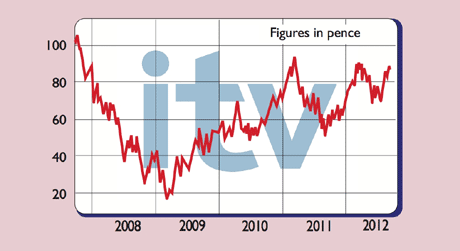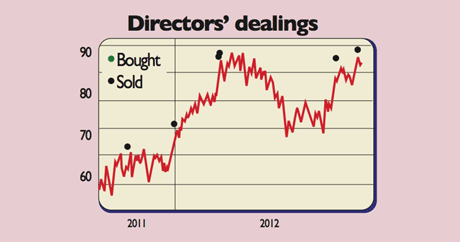Shares in focus: Britain’s largest TV network
ITV has had its problems. But could the TV network's turnaround strategy work this time, and should you buy the shares? Phil Oakley investigates.
Get the latest financial news, insights and expert analysis from our award-winning MoneyWeek team, to help you understand what really matters when it comes to your finances.
You are now subscribed
Your newsletter sign-up was successful
Want to add more newsletters?

Twice daily
MoneyWeek
Get the latest financial news, insights and expert analysis from our award-winning MoneyWeek team, to help you understand what really matters when it comes to your finances.

Four times a week
Look After My Bills
Sign up to our free money-saving newsletter, filled with the latest news and expert advice to help you find the best tips and deals for managing your bills. Start saving today!
ITV is one to watch and buy, says Phil Oakley.
The business
ITV is the largest commercial television network in Britain. It has five television channels: ITV 1, ITV 2, ITV 3, ITV 4 and CITV (Children's ITV). These are broadcast free-to-air across various platforms. These channels make money by selling advertising slots and also from the sponsorship of TV programmes.
ITV receives similar income streams from its online business. This is centred on the ITV.com website and ITV Player, which offers television programmes on demand. ITV Studios makes programmes for ITV but also sells them to other countries. ITV had sales of £2.1bn in 2011.
MoneyWeek
Subscribe to MoneyWeek today and get your first six magazine issues absolutely FREE

Sign up to Money Morning
Don't miss the latest investment and personal finances news, market analysis, plus money-saving tips with our free twice-daily newsletter
Don't miss the latest investment and personal finances news, market analysis, plus money-saving tips with our free twice-daily newsletter
The history
ITV began life in 1955 when it started broadcasting on channel three in the London area. By 1973 there were 15 regional ITV licences in Britain, with each licence run by a separate company. This remained the status quo until the early 1990s when Granada and Carlton set about buying up regional ITV firms. By 2001, they owned 11 of the 15 licences. In 2004, Granada and Carlton merged to form ITV plc, having previously co-operated on a number of ventures.
ITV has a chequered history. It has continually had to battle the ups and downs of the advertising market while coping with burdensome public-sector broadcasting obligations. It's also made a number of high-profile mistakes, such as its ITV Digital venture, which failed to create a credible pay-TV business, and its acquisition of the Friends Reunited website, which it later sold at a loss.
The growth of the internet and powerful rivals such as BSkyB and the BBC haven't helped matters. Several CEOs have tried to put ITV on a firmer footing during the last decade, but seemed to end up running hard to stand still. However, the current turnaround plan under the leadership of Adam Crozier does seem to be bearing fruit.
The chief executive
Crozier has been CEO since 2010. Before that he had held high-profile jobs at organisations including Saatchi & Saatchi, the Football Association and Royal Mail. His seven-year spell at Royal Mail was particularly eventful, with Crozier hailed by some for taking the business from losses to profits, and loathed by others for closing thousands of post offices and ending the second post and Sunday collections. Last year he was paid £1.5m.
Should you buy the shares?
ITV's profits are very sensitive to changes in advertising revenues there's no getting away from that. This is not something that is going to change quickly, but could ITV's turnaround strategy actually work this time? There are some promising signs. Underlying sales growth at ITV Studios has been building for the last couple of years as more of its programmes are sold overseas. It is also supplying more of ITV's own output, which should help profits. ITV also has a good line-up of entertainment, drama and sports programming that remains popular with British households. This means that it cannot be ignored by advertisers.
ITV's immense TV archive also offers significant profit potential. The growth of on-demand TV is well suited to monetising this asset, as recent deals with the likes of Netflix, LoveFilm and Sky demonstrate. A pay version of the ITV Player could also make money in this area. Throw in some further cost savings and ITV could deliver some decent profit growth going forward.
The company's pension fund deficit is a slight concern, but is being addressed. Otherwise it has impeccable finances with net cash on its balance sheet, having got rid of nearly £1bn of debt during the last three years. ITV now looks a lot less risky for investors, yet trades on a modest multiple of expected profits.
As long as the advertising market does not collapse, the company should keep producing good cash flows while remaining a significant broadcasting asset. We think the shares are worth buying.
The numbers

Stockmarket code: ITV
Share price: 87p
Market cap: £3.4bn
Net assets (June 2012): £807m
Net cash (June 2012): £92m
P/e (current year estimate): 10.4 times
Yield (prospective)2.7%
What the analysts say
Buy: 14
Hold: 5
Sell: 6
Average price target: 90p
Directors' shareholdings

A Crozier (CEO): 295,907
I Griffiths (FD): 881,852
A Norman (Chairman): 971,584
Get the latest financial news, insights and expert analysis from our award-winning MoneyWeek team, to help you understand what really matters when it comes to your finances.
Phil spent 13 years as an investment analyst for both stockbroking and fund management companies.
-
 What is a care fees annuity and how much does it cost?
What is a care fees annuity and how much does it cost?How we will be cared for in our later years – and how much we are willing to pay for it – are conversations best had as early as possible. One option to cover the cost is a care fees annuity. We look at the pros and cons.
-
 How to navigate the inheritance tax paperwork maze in nine clear steps
How to navigate the inheritance tax paperwork maze in nine clear stepsFamilies who cope best with inheritance tax (IHT) paperwork are those who plan ahead, say experts. We look at all documents you need to gather, regardless of whether you have an IHT bill to pay.
-
 ITV takes on the streaming giants
ITV takes on the streaming giantsFeatures Britbox, ITV’s new subscription video-on-demand service, will compete with Netflix and Amazon.
-
 Somero: trading this overlooked bargain
Somero: trading this overlooked bargainFeatures Mechanical-screed maker Somero dominates its niche and is attractively valued. Matthew Partridge picks the best way to trade it.
-
 How to find big profits in small companies
How to find big profits in small companiesCover Story The small- and micro-cap sectors are risky and volatile. But with careful research and patience, investors could make huge gains. Matthew Partridge explains how to find the market’s top tiddlers.
-
 The hidden gems on Aim, London's junior market
The hidden gems on Aim, London's junior marketFeatures Aim, London’s junior market, is risky – but you can find solid stocks at low prices. Scott Longley reports.
-
Three Aim-listed firms that will thrive in a post-Brexit world
Opinion Matt Tonge and Victoria Stevens of the Liontrust UK Smaller Companies Fund pick three Aim-listed firms that will survive Brexit turmoil.
-
Fetch! The Chinese small-cap stocks to buy in the Year of the Dog
Opinion Each week, a professional investor tells us where she’d put her money. This week: Tiffany Hsiao of Matthews Asia selects three Chinese small-cap stocks with exciting potential.
-
Small and mid-cap stocks with big potential
Opinion Professional investor Guy Anderson of the Mercantile Investment Trust selects three small and medium-sized firms with promising prospects that the market has missed.
-
 Get cheap, reliable growth from smaller companies
Get cheap, reliable growth from smaller companiesFeatures One of the most reliable long-term investment trends is the long-term outperformance of smaller companies over blue chips. Max King picks some of the best ways to buy into this growth.